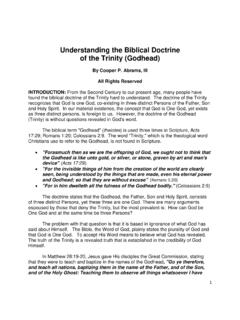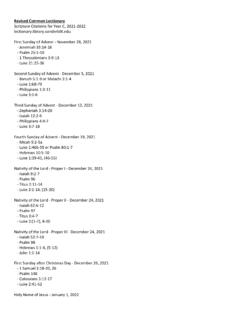Transcription of Lesson (page 96 of Standard Edition) Deuteronomy in the ...
1 (page 96 of Standard Edition) 15012 Deuteronomy in the New TestamentSabbath afternoonRead for This Week s Study: Matt. 4:1 11, Deut. 8:3, Acts 10:34, Gal. 3:1 14, Acts 7:37, Heb. 10:28 Text: It is written, Man shall not live by bread alone, but by every word that proceeds from the mouth of God (Matthew 4:4, NKJV). The New Testament is saturated with the Old. That is, the inspired writers of the New Testament quoted the inspired writers of the Old as a source of authority. Jesus Himself said, It is written (Matt. 4:4), meaning, It is written in the Old Testament; and He said that the Scriptures must be fulfilled (Mark 14:49, NKJV) meaning the Scriptures of the Old Testament. And when Jesus met two disciples on the road to Emmaus, instead of doing a miracle to show them who He was, beginning at Moses and all the Prophets, He expounded to them in all the Scriptures the things concerning Himself (Luke 24:27, NKJV).
2 Whether direct Old Testament quotations, or allusions, or references to stories or prophecies, the New Testament writers constantly used the Old Testament to buttress, even justify, their claims. And among the books often quoted or referred to was Deuteronomy (along with Psalms and Isaiah). Matthew, Mark, Luke, John, Acts, Romans, Galatians, 1 and 2 Corinthians, Hebrews, the pastoral epistles, and Revelation all go back to Deuteronomy . This week we ll look at a few of those instances and see what truth, present truth, we can draw from them.* Study this week s Lesson to prepare for Sabbath, December 18.*December 11 17 Lesson (page 97 of Standard Edition) 151 December 12 It Is Written Read Matthew 4:1 11. How did Jesus respond to Satan s temptations in the wilderness, and what is the important Lesson here for us in His response? _____ _____Jesus didn t argue with Satan or debate with him.
3 He simply quoted Scripture because, as the Word of God, it is living and powerful, and sharper than any two-edged sword (Heb. 4:12, NKJV). And in each case, the Word He quoted was from Deuteronomy . How interesting that Jesus, in the wilderness, chose to quote texts that were given to Israel in the wilderness, as the first temptation, Jesus referred to Deuteronomy 8:3. Moses had been recounting to the people of Israel how the Lord had provided for them all those years in the wilderness, including giving them manna all part of a refining process, as the Lord was seeking to teach them spiri tual lessons. And among those lessons was the one that man shall not live by bread alone; but man lives by every word that proceeds from the mouth of the Lord (NKJV). God fed you physical food, but He also gives you spiritual nourishment. You can t take only the first without the second.
4 Jesus used the image of bread as a transition to Deuteronomy and to rebuke Satan and the doubt he tried to instill in the second temptation, Jesus went back to Deuteronomy 6:16, where Moses pointed the people back to their rebellion in Massah (see Exod. 17:1 7), saying, You shall not tempt the Lord your God as you tempted Him in Massah (NKJV). The word for tempt can mean try or test. The Lord already had shown them, again and again, His power and willingness to provide for them; yet, the moment trouble came, they cried out, Is the Lord among us or not? (Exod. 17:7, NKJV). And it was from that story that Jesus drew from the Word of God to rebuke the third temptation, Satan this time sought to get Christ to bow down and worship him. What an open and blatant revelation of just who he really was and what he really wanted!
5 Rather than debate, Jesus rebuked Satan and again reverted to the Word of God, Deuteronomy , where the Lord was warning His people about what would happen if they were to fall away and worship other gods. You shall fear the Lord your God and serve Him (Deut. 6:13, NKJV), meaning Him and Him alone. How can we learn to draw more power in our own lives from our study of the Word of God in order to reflect more fully the char-acter of Jesus and, like Him, resist Satan s temptations?sunday (page 98 of Standard Edition) 152 December 13 Lifting Up FacesIn Deuteronomy 10, Moses (again) was recounting Israel s history and (again) used those accounts to admonish his people to faithfulness. Amid that admonishment he said something Deuteronomy 10:17 19. What s the essential message to the peo-ple here, and why is this message relevant to God s church today? _____ _____The phrase shows no partiality is translated from a Hebrew figure of speech; it means literally that He does not lift up faces.
6 This is believed to have come from a legal setting in which the judge or king sees the face of the person on trial and, based on that person s status (important person or someone insignificant), the judge or king renders a verdict. The implication here in Deuteronomy is that the Lord doesn t treat people in such a manner, despite His great power and might. He s fair with everyone, regardless of their status. This truth, of course, was revealed in the life of Jesus and how He treated even the most despised in Acts 10:34, Romans 2:11, Galatians 2:6, Ephesians 6:9, Colossians 3:25, and 1 Peter 1:17. How do these texts make use of Deuteronomy 10:17? _____ _____However varied the circumstances in each one of these references (in Ephesians Paul tells masters to be careful how they treat their slaves; in Romans Paul is talking about the fact that, when it comes to salvation and condemnation, there s no difference between Jews and Gentiles), they all go back to Deuteronomy and to the idea that God does not lift up faces.
7 And if the God of gods and Lord of lords, the great God, mighty and awesome won t do it, then certainly we shouldn t, as well. Particularly in how Paul in Romans frames it, we can see a revelation of the gospel: we are all on the same plane, regardless of who we are in terms of status. We are all fallen beings in need of God s saving grace. And the good news is that, regardless of our status, we all are offered salvation in Jesus often, even subtly, do you lift up faces, and why does the Cross show us how sinful that attitude really is?Monday (page 99 of Standard Edition) 153 Cursed on a Tree Read Galatians 3:1 14. What is Paul saying there that is relevant to us today, and how does he use Deuteronomy 27:26 and Deuteronomy 21:22, 23 to make his point? _____ _____Unfortunately, it s common in Christianity to use this letter as some kind of justification for not keeping the law, the Ten Commandments.
8 Of course, that argument is really used as a reason not to keep the fourth commandment, as if keeping that one commandment, as opposed to the other nine, is somehow an expression of the legalism that Paul was dealing with , Paul was not speaking against the law, and certainly nothing in this passage could justify breaking the Sabbath commandment. The key can be found in Galatians 3:10, where he writes that all who rely on the works of the law are under a curse (NIV), and then he quotes Deuteronomy 27:26. The issue isn t obedience to the law, but relying on the law a tough position, if not an impossible one, for fallen beings such as ourselves. Paul s point is that we are not saved by the works of the law, but by Christ s death on our behalf, which is credited to us by faith. His emphasis here is on what Christ has done for us at the cross.
9 And to help make this point, he refers back to Deuteronomy again, this time Deuteronomy 21:23. Like Jesus, Paul says, It is written, showing the authority of the Old Testament, and now he quotes from a text dealing with someone who, having committed a capital crime, and having been executed for it, was then hung on a tree, perhaps as a deterrent to others. Paul, though, uses that as a symbol for Christ s substitutionary death in our behalf: Christ became a curse for us in that He faced the curse of the law; that is, death, which all humans would face because all have violated the law. The good news of the gospel, however, is that the curse that should have been ours became His, at the cross, that we might receive the promise of the Spirit through faith (Gal. 3:14, NKJV). Or, as Ellen G. White said it: None but Christ could redeem fallen man from the curse of the law and bring him again into harmony with Heaven.
10 Christ would take upon Himself the guilt and shame of sin sin so offensive to a holy God that it must separate the Father and His Son. Ellen G. White, Patriarchs and Prophets, p. about what you would face if you were to receive the just pun-ishment for whatever wrongs you have committed. However, because Christ bore the punishment for your wrongs in Himself, so that you don t have to, what should your response to His sacrifice be?TuesdayDecember 14 (page 100 of Standard Edition) 154 December 15A Prophet Like Unto TheeAgain and again, the Lord had warned Israel not to follow after the practices of the nations around them. On the contrary, they were to be witnesses to those nations (Deut. 4:6 8). In Deuteronomy 18:9 14, Moses again warns them about their specific practices, which were an abomination to the Lord (Deut. 18:12, NKJV). In that context then, he tells them that they must be blameless before the Lord your God (Deut.)













